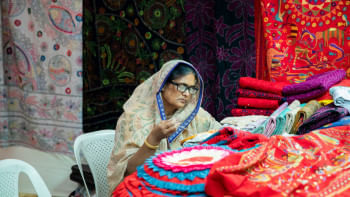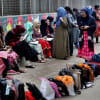The inspiring story of Nijer Bolar Moto Ekta Golpo Foundation

Iqbal Bahar Zahid is an entrepreneur and founder of Nijer Bolar Moto Ekta Golpo Foundation. In an interview with Eresh Omar Jamal of The Daily Star, he talks about his foundation and how it seeks to help Bangladeshis become entrepreneurs, and improve their lives and the society.
Can you tell us briefly about Nijer Bolar Moto Ekta Golpo Foundation and why you started it?
I enjoyed doing volunteer work even when I was young, and I wanted to do something big for Bangladesh. When looking for societal problems I could solve, I found that the basic problem our youths face is that, despite graduating from university, they have no skills outside that. They are not very articulate. They can't speak boldly or smartly even in Bangla, let alone English. They also lack communication skills, such as maintaining good posture or eye contact when speaking with someone.
Aside from our youths lacking necessary but basic skills, Bangladesh has a major unemployment crisis. There are nearly 40 lakh unemployed graduates in the country. What are they supposed to do, when there aren't many public or private jobs available? So, I thought, if I could give them some advice and motivation to do something on their own, perhaps they could get out of this cycle of unemployment.
That is why I launched this initiative in 2018. At our foundation, we provide training on entrepreneurial skills based on 16 subjects and 400 components, to people in 64 districts and 492 upazilas where our organisational teams work. Every batch receives 90 days of continuous training. Over the last five years and three months, we have given free training to 666,000 young individuals in 21 batches. So far, our programme has created more than 100,000 entrepreneurs who have created about 500,000 employment opportunities in the country.
Not only that, we are also training Bangladeshis living abroad for free in 50 different countries. Those who live in the Middle East especially have to return to Bangladesh at some point. But they are unsure of what to do once they return. I am teaching them how to use their hard-earned earnings and giving them skills which they can use to increase their income while living abroad, and which they can also use to start their own business after returning to Bangladesh.
While looking at potential names for the foundation, I thought that every individual should have a life story which their parents can be proud of, and which their children and society can be inspired by. There are many people today who have amassed a lot of wealth. But their stories are not really worth writing about. It is, however, worthwhile to write the story of someone who, besides building themselves up, has helped build up others around them. Keeping this in mind, I wanted to set up something different, which takes into consideration the importance of becoming a moral and complete human being.
I didn't want my initiative to be Dhaka-centric. I wanted to include people who have never even been to Dhaka. I also wanted to give free training to people, every single day, which I have managed to do so far.
There have been stories of people who started their own business at a small capacity after going through training, but are now making crores of taka in profit. How do you think that benefits you and the society?
Personally, I have not benefitted financially at all, and I never planned to. I wanted to create a mindset among the youth that they can do something good for their country. And there are around 3,000 volunteers who also work with me for free. The one big benefit I get is that it gives me a great deal of mental satisfaction. When I see someone from a remote village, who had never been to Dhaka before, coming to Dhaka and proudly sharing his story with 5,000 people, it gives me a lot of peace and happiness.
For the last five years, I haven't watched any television shows or movies (something I used to do a lot before). Instead, I devote that time to training them. It helps me sleep better at night. And these individuals do a lot of volunteering work in return – whether it be helping flood-affected people, distributing food during Ramadan, or something else.
A lot of divorced women who are single mothers are also now able to send their children to school and earn their own living through entrepreneurship, after receiving the training. So, all the positive impacts these people are having on society makes me very happy.
So, indirectly you are benefitting from living in a better society?
Yes, definitely.
Don't you think that more people, who are comparatively more privileged, should step up similarly to improve society, so they can also benefit from it?
Absolutely. And that is what I am trying to instil in my students. We live in a society where we are mindlessly hurting, lying, insulting, and swindling each other. We are killing each other indiscriminately. We have to change as a society. And that is something I am trying to do. I am trying to create a network of good human beings, and I have somewhat succeeded in doing that. You will be surprised to know that more than one lakh activities are happening in our group every day. But there is zero negativity. That is unheard of, especially when it comes to social media.
So, I want to tell the youth, even without doing politics, we can all have something to contribute to our country. Even if we simply fulfilled our own duties with sincerity, without being corrupt, without participating in things that we know are harmful for society, even that can make Bangladesh better.
Another thing that I want to say is that our young boys and girls from the villages – because I work mostly with them – are extremely intelligent and hard-working. But everyone keeps them down from the very beginning, telling them they are not smart enough and are good for nothing. But by sharing their achievements, I have already shown the whole world what they are capable of. All they need is some encouragement.
Why do you think your foundation has seen so much success?
There are a few reasons. One is that I haven't taken a day off from work, from giving training to students. For the first year, it was difficult for me to explain or even convince my students of what my intentions were. Everyone thought I must want something out of it, including those close to me. Eventually, they realised that all I wanted was to train people, make them more competent. And that motivated them in turn to do good for society.
Every initiative needs some outside-the-box ideas, and I have tried to put some into mine. Almost no training institutions ever follow up on their trainees, see how they are doing. But I have maintained contact with people who were in my very first batch even. I formulate ideas and plan different programmes throughout the year to keep them involved. Another important thing is to give them mentoring, so that the businesses they have set up continue to flourish.
We have also created an open market system within the foundation. Previously, it used to be a once-a-week event, Now we hold it twice a week for 12 hours a day. In fact, some of our entrepreneurs are making 30-90 percent of their earnings from open market transactions alone.

 For all latest news, follow The Daily Star's Google News channel.
For all latest news, follow The Daily Star's Google News channel. 













Comments